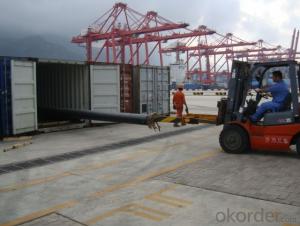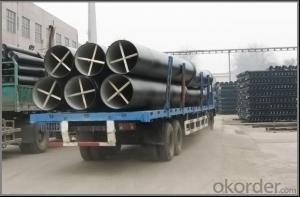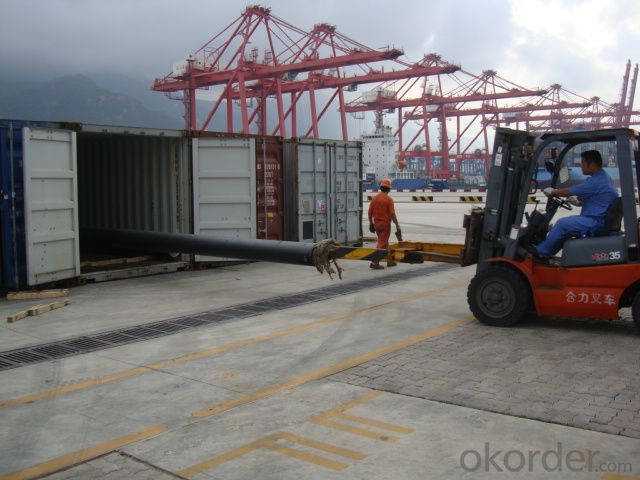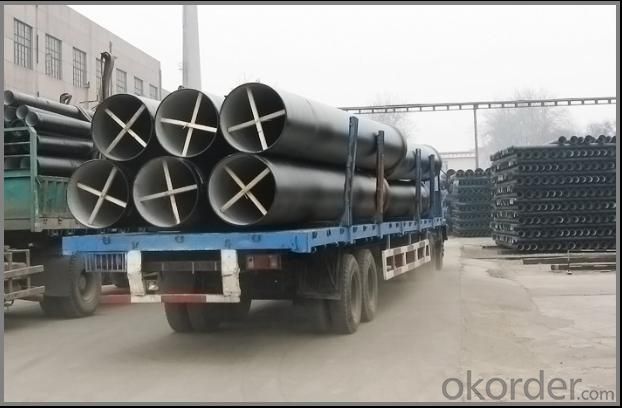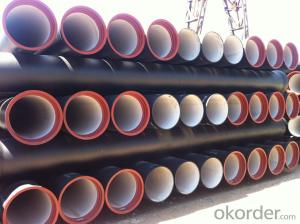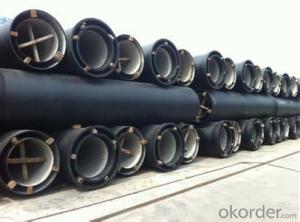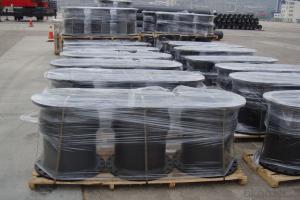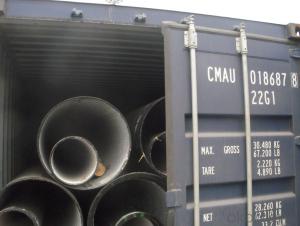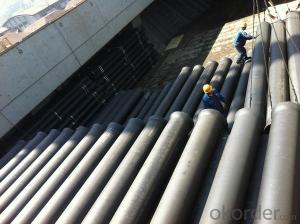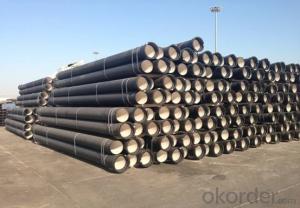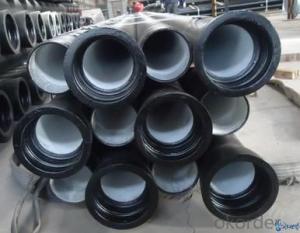DUCTILE IRON PIPE C Class DN 400
- Loading Port:
- Tianjin
- Payment Terms:
- TT OR LC
- Min Order Qty:
- -
- Supply Capability:
- 30000Tons m/month
OKorder Service Pledge
OKorder Financial Service
You Might Also Like
CNBM ductile iron pipe ranges from DN80-DN1600mm (T-Type, Class K9), effective length 6m, comply with ISO2531 Standard
Company Profile
CNBM International Corporation is the leading production base and renowned supplier of Ductile Iron Water Pipe systems of both potable and waste water in China. We are constantly looking to develop high quality products to ensure the longest service life and wonderful performance.
CNBM Pipelines regard quality as the essential factor leading to successful business. Every pipe is tested in accordance with BS EN545 (water application) or BS EN598 (sewer application). CNBM Pipelines products comply with and are tested according to the relevant European and International Standards. Our pipes are manufactured under the quality management system BS EN ISO 9001. After years of efforts, CNBM Pipelines has built up great reputation in terms of quality and service among customers worldwide
Product Introduction
CNBM ductile iron pipe ranges from DN80-DN1600mm (Tyton, T-Type, Class K7/K8/K9), effective length: 6m, complying with BS EN545/EN598/ISO2531/BS4772.
Specification& Payment terms
Internal lining: Pipes shall have an internal cement mortar lining in acc with ISO4179.
External coating: Pipes shall be externally coated with metallic zinc spray plus a further layer of resin painting to ISO8179.
Gasket: 100% SBR/NBR/EPDM gasket in accordance with ISO4633.
Packing: Pipes from DN100 to DN300 be bundled with steel belts, the others are in bulk.
Payment term: By 30% T/T advance payment + 70% Irrevocable L/C at sight.
Packing: In bulk vessel or in container.
- Q: Can ductile iron pipes be used for underground fire hydrant systems?
- Yes, ductile iron pipes can be used for underground fire hydrant systems. Ductile iron pipes are known for their strength and durability, making them suitable for underground applications. They have excellent resistance to corrosion and can withstand high pressures, which are essential requirements for fire hydrant systems. Additionally, ductile iron pipes have a long service life, reducing the need for frequent replacements and maintenance, making them a cost-effective choice for fire hydrant systems.
- Q: Does centrifugal cast iron pipe work well with lining cement? Will it scale and breed bacteria?
- Poor hydraulic performance and high energy consumption. The roughness coefficient of the prestressed reinforced concrete pipe is between 0.013 - 0.014, so that the pipeline resistance of the pipeline with the same pipe diameter is higher than that of the same water content. Because of its high roughness, after a period of use, the pipeline will be blocked by bacteria, shellfish breeding and reproduction. As the service life increases, the inner diameter of the pipe will gradually shrink and the resistance will increase.
- Q: What is the expected fire resistance of ductile iron pipes?
- The expected fire resistance of ductile iron pipes can vary depending on several factors such as the thickness of the pipe walls, the quality of the installation, and the surrounding conditions. However, generally speaking, ductile iron pipes have a high fire resistance due to their durable and heat-resistant material composition. Ductile iron is made by adding a small amount of magnesium to cast iron, which enhances its strength and flexibility. This makes ductile iron pipes less susceptible to cracking or breaking under high temperatures compared to other materials like PVC or HDPE pipes. In terms of fire resistance, ductile iron pipes can withstand high temperatures for an extended period of time without significant structural damage. They have been tested and proven to maintain their integrity in fire conditions for up to 2-4 hours, depending on the specific pipe design and installation. It is important to note that while ductile iron pipes have a high fire resistance, they are not fireproof. In case of a fire, it is crucial to follow proper fire safety protocols and consult with professionals to ensure the safety of the system and surrounding infrastructure.
- Q: How do ductile iron pipes compare to PVC pipes in terms of strength?
- Ductile iron pipes are generally considered to be stronger than PVC pipes. Ductile iron is a type of cast iron that has been treated with trace amounts of magnesium to give it enhanced strength, flexibility, and ductility. This makes ductile iron pipes highly resistant to cracking and breaking under pressure, making them suitable for a wide range of applications including water and wastewater transportation. On the other hand, PVC pipes are made from a type of plastic called polyvinyl chloride. While PVC pipes are relatively strong and durable, they are not as strong as ductile iron pipes. PVC pipes are more prone to cracking and breaking under high pressure or when exposed to extreme temperature fluctuations. They are often used for low-pressure applications such as irrigation and drainage systems. In terms of strength, ductile iron pipes have a higher tensile strength and can withstand higher internal and external pressures compared to PVC pipes. Ductile iron pipes also have a higher impact resistance, making them less susceptible to damage from external forces such as heavy machinery or accidental impacts. However, it is important to note that the choice between ductile iron and PVC pipes ultimately depends on the specific requirements of the project. Factors such as cost, installation ease, corrosion resistance, and the nature of the fluid being transported should all be considered when deciding between these two materials.
- Q: What is the lifespan of ductile iron pipe?
- The lifespan of ductile iron pipe can vary depending on several factors such as the quality of the pipe, installation conditions, and maintenance practices. On average, ductile iron pipe can last for 50 to 100 years or more, making it a durable and long-lasting option for water and wastewater infrastructure.
- Q: Method for joining cast iron pipes
- The connection between the pipe and the pipe adopts the form of socket type or flange disk interface. According to the function, it can be divided into two kinds: flexible interface and rigid interface. The flexible interface is sealed with rubber ring, which allows a certain degree of corner and displacement, so it has good seismic resistance and tightness. It is easy and quick to install than rigid interface. It has little labor intensity according to the casting method.
- Q: Can ductile iron pipes be repaired if damaged?
- If there is any damage to ductile iron pipes, they can indeed be repaired. The process of repairing them involves several steps. Firstly, it is necessary to identify and isolate the damaged section of the pipe. Once this has been accomplished, the damaged portion of the pipe is typically cut out and removed. Subsequently, a new section of pipe is inserted and connected to the existing pipeline using appropriate methods such as welding or mechanical jointing. The repaired section is then tested to guarantee its integrity and functionality. It is important to note that the repair process may vary depending on the extent and nature of the damage. Therefore, it is always advisable to seek advice from professionals who specialize in ductile iron pipe repairs to ensure a proper and effective restoration is achieved.
- Q: Can ductile iron pipe be used for oil and gas transmission pipelines?
- Yes, ductile iron pipe can be used for oil and gas transmission pipelines. It offers excellent strength, durability, and corrosion resistance, making it suitable for the transportation of various fluids, including oil and gas. However, other factors such as specific project requirements, operating conditions, and regulatory standards should also be considered before making a final decision.
- Q: How do ductile iron pipes perform in high-traffic areas?
- Due to their inherent strength and durability, ductile iron pipes exhibit exceptional performance in high-traffic areas. The composition of these pipes includes graphite nodules, which impart them with their characteristic ductility. This ductility enables the pipes to flex and endure heavy loads and vibrations caused by traffic without experiencing any cracks or breaks. In areas with high traffic, where the ground is constantly in motion and subjected to heavy vehicle loads, ductile iron pipes demonstrate superior resistance to stress and impact. Their capacity to absorb and distribute the pressure from traffic ensures that these pipes maintain their structural integrity over time. This aspect is particularly significant since any damage or failure in a pipe system can lead to expensive repairs and disruptions in the water supply. Moreover, ductile iron pipes possess a high level of resistance to corrosion, making them suitable for installation in high-traffic areas exposed to diverse environmental conditions. Typically, these pipes are lined with a protective layer, such as cement mortar or epoxy, which provides an additional barrier against external factors. This resistance to corrosion guarantees the longevity of the pipes and reduces the need for frequent maintenance or replacement. Furthermore, ductile iron pipes exhibit excellent flow characteristics, enabling efficient water distribution even in areas with high traffic demands. The smooth interior surface of these pipes minimizes friction and pressure losses, ensuring a consistent and reliable water supply to meet the needs of the surrounding population. In conclusion, ductile iron pipes are a reliable and robust choice for high-traffic areas. Their strength, durability, resistance to corrosion, and efficient flow characteristics make them well-suited to withstand the demands and challenges posed by heavy traffic. They guarantee the continuous supply of water without compromising the structural integrity of the pipe system.
- Q: What is the weight of a typical ductile iron pipe?
- The weight of a typical ductile iron pipe can vary depending on its diameter, length, and thickness. However, a common range for ductile iron pipes is between 1 to 5 pounds per foot.
Send your message to us
DUCTILE IRON PIPE C Class DN 400
- Loading Port:
- Tianjin
- Payment Terms:
- TT OR LC
- Min Order Qty:
- -
- Supply Capability:
- 30000Tons m/month
OKorder Service Pledge
OKorder Financial Service
Similar products
Hot products
Hot Searches
Related keywords
